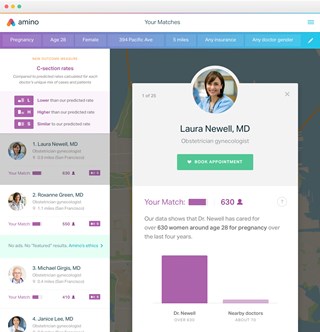 San Francisco-based Amino, a new company that aims to use big data to help match consumers with the best doctor for them, has launched with $19.4 million in funding. Accel Partners, Charles River Ventures, Rock Health, and a number of individual investors contributed to the round.
San Francisco-based Amino, a new company that aims to use big data to help match consumers with the best doctor for them, has launched with $19.4 million in funding. Accel Partners, Charles River Ventures, Rock Health, and a number of individual investors contributed to the round.
CEO and co-founder David Vivero previously founded RentJuice, an apartment renting startup that was ultimately acquired by Zillow for $40 million. Amino's advisory board includes Dr. Ashish Jha, director of the Harvard Global Health Institute; Dr. Arnold Millstein, director of the Stanford Clinical Excellence Research Center; former Dean of the Stanford University School of Medicine Dr. Phillip Pizzo; Dr. Robert Wachter, interim chair of the department of medicine at UCSF; and Joy Pritts, former Chief Privacy Officer at ONC.
The core of the company's offering is a huge de-identified database of patient experiences, two years in the making. Engineers at Amino compiled the database from insurance claims data and boast that it contains experiences from 188 million patients that concern 893,000 doctors, nearly every practicing physician in the country. It all amounts to 3.9 billion distinct interactions.
Amino will use that database to match patients with the doctor who has best served patients who share their demographic and treatment profile. They can also filter results to find the best local doctor who takes their insurance. Then patients can book an appointment right from inside the platform.
“Health care is an essential part of our society, yet the process is not oriented around those who matter most – the people getting care. Every day, we make important decisions that drastically affect our lives without enough information to feel confident,” Vivero said in a statement. “Amino’s mission is to change this, giving everyone access to never-before-seen data and insights to become more informed and take charge of their health care. We’re starting with the search to find the right doctor, but the potential to use our data to help people navigate their health care choices is massive.”
Over time, Amino hopes to use the claims data for more than just connecting doctors and patients. They'll release insights about particular procedures, for instance, and could extend into price and quality comparison tools.
“Even though individuals are paying more and more for their health care, the industry still acts like the insurance companies are the primary customer,” Brian O’Malley, partner at Accel, said in a statement. “Yet, healthcare is the only industry where quality of product is not correlated with price. A great doctor is just as expensive as an average one."


















